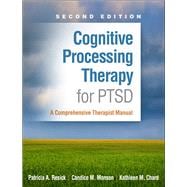The authoritative presentation of cognitive processing therapy (CPT) for posttraumatic stress disorder (PTSD) is now in a revised and updated second edition, with an easier-to-use format and a new chapter on conceptualizing treatment. From CPT's developers, the manual includes session-by-session implementation guidelines and extensive sample dialogues. Shaded index tabs in the margins help clinicians quickly navigate to each session. The authors explain the theoretical and empirical underpinnings of CPT and discuss ways to work effectively with specific populations, such as combat veterans, sexual assault survivors, and culturally diverse and LGBTQIA+ clients. Forty-eight reproducible handouts can be photocopied from the large-size book or downloaded from the companion webpage.
New to This Edition
*Each session now has its own chapter, printed with shaded tabs for easy reference.
*Reflects a wealth of new treatment research, conceptual refinements, and feedback from trainings of thousands of clinicians.
*Chapter on cognitive case conceptualization.
*Discusses additional treatment variations (telehealth, intensive CPT) and client populations (first responders).
CPT is endorsed as a best practice for the treatment of PTSD by the U.S. Departments of Veterans Affairs and Defense, the International Society for Traumatic Stress Studies, and the U.K. National Institute for Health and Care Excellence (NICE).
See also Getting Unstuck from PTSD, by Patricia A. Resick, Shannon Wiltsey Stirman, and Stefanie T. LoSavio, which presents CPT in a guided self-help format for trauma survivors.








